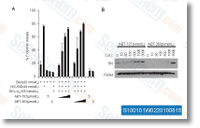Accordingly, we observed 4T1 tumors to exhibit robust staining for the macro phage marker F480, a result that was not recapitulated with PF 562271 administration. As a result, we show for the first time that, as well as the important roles FAK plays in directing carcinoma cell function and behavior, the PTK activ ity of FAK is also clearly necessary for regulating innate immunity within the microenvironments of establishing and progressing mammary tumors. We subsequent applied the 4T1 TR II model to access the distinct part of FAK in TGF driven breast cancer metastasis. As shown in Figure 7a, FAK depletion had no impact on main tumor development of 4T1 TR II cells. Furthermore, despite the fact that FAK defi cient 4T1 TR II cells had been nonetheless very metastatic, FAK deple tion did drastically reduce the immediate pulmonary dissemination of 4T1 TR II cells.
These information sug gest that FAK selectively regulates the initial actions of tumor cell dissemination stimulated by TGF,a outcome that may be consist ent with our findings on the requirement selelck kinase inhibitor of FAK in mediating EMT stimulated by TGF and preventing pri mary colonization of breast cancer cells inside the lung, but not their secondary outgrowth. Moreover, we located no differences inside the MEK162 dissolve solubility potential of manage or FAK deficient 4T1 cells to colonize the lungs following their injection in to the tail vein of BalbC mice. Taken together, these data recommend that the cou pling of TGF to FAK promotes the initial invasion and exit of breast cancer cells from the principal tumor web site. In addition, and similar to handle 4T1 cells, PF 562271 administration commence ning 1 week soon after engraftment of 4T1 TR II cells significantly lowered their growth in mice.
on the other hand, this exact same therapy protocol had no effect around the subsequent metasta  sis of 4T1 TR II cells. Collectively, these findings give the initial evidence that FAK activity could be inhibited chemotherapeutically as an efficient two pronged strategy to lessen the growth and metastasis of breast cancers. Furthermore, these benefits also show that amplified TGF signaling in breast cancer cells is capable of driving early tumor cell dissemination from the major mam mary tumor. Discussion TGF is actually a principal player involved in suppressing mammary tumorigenesis by sustaining the composition of standard MEC microenvironments through its ability to inhibit the proliferation and survival of normal MECs. In stark contrast, mam mary tumorigenesis has evolved a variety of mechanisms capa ble of subverting the tumor suppressing functions of TGF and of conferring oncogenic and metastatic properties on this multifunctional cytokine.
sis of 4T1 TR II cells. Collectively, these findings give the initial evidence that FAK activity could be inhibited chemotherapeutically as an efficient two pronged strategy to lessen the growth and metastasis of breast cancers. Furthermore, these benefits also show that amplified TGF signaling in breast cancer cells is capable of driving early tumor cell dissemination from the major mam mary tumor. Discussion TGF is actually a principal player involved in suppressing mammary tumorigenesis by sustaining the composition of standard MEC microenvironments through its ability to inhibit the proliferation and survival of normal MECs. In stark contrast, mam mary tumorigenesis has evolved a variety of mechanisms capa ble of subverting the tumor suppressing functions of TGF and of conferring oncogenic and metastatic properties on this multifunctional cytokine.
Jakenzyme
Biological groups is various
